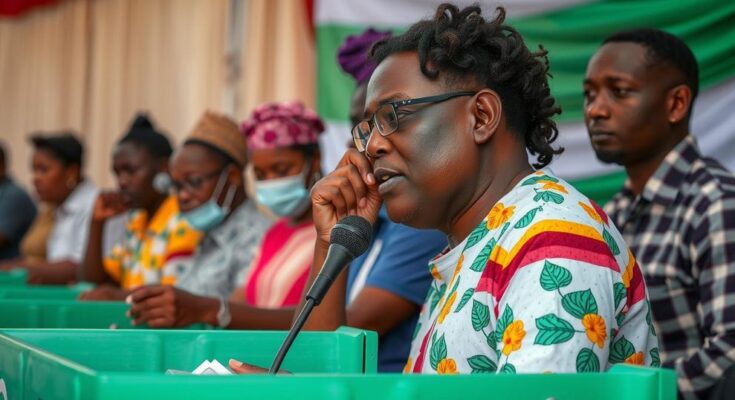Ghana’s December 7 elections feature former President John Mahama challenging Vice President Mahamudu Bawumia. With a focus on economic recovery and job creation, this election is highly competitive, marked by voter dissatisfaction with traditional parties. Issues of debt, inflation, and new political candidates are at the forefront as Ghanaians prepare to make their choice in a climate of change.
Ghana’s upcoming national elections on December 7 are anticipated to be intensely competitive, primarily featuring former President John Mahama of the National Democratic Congress (NDC) as he challenges current Vice President Mahamudu Bawumia of the New Patriotic Party (NPP). Mahama has proposed a transformative 24-hour business environment aimed at creating job opportunities and revitalizing an economy recovering from a significant $30 billion external debt default in 2022. Bawumia, on the other hand, emphasizes his commitment to economic stability amidst the aftermath of the COVID-19 pandemic and rising domestic pressures.
Historically, Ghana’s political landscape has predominantly been shaped by the NDC and NPP since the return to democratic governance in 1992. Analysts such as University of Ghana senior lecturer Kwame Asah Asante predict that one of these two dominant parties will most likely secure victory, as minor parties have consistently struggled to gain substantial voter support. However, there is a potential for minor candidates to influence the election dynamics if they gather more than 4% of the vote, leading to a possible runoff.
The capital city of Accra is adorned with campaign billboards, reflecting a palpable excitement among voters as they prepare to choose between the long-established parties. Many citizens, like Angela Ofori, express their dissatisfaction with the two-party system, seeking an alternative to break the continuous cycle of NPP and NDC governance and influence positive changes. Others, such as John Taden, mention emerging independent candidates like Nana Kwame Bediako, whose innovative ideas resonate with the youth, albeit without significant traction in the polls.
The economic climate serves as a pivotal focal point in the elections, particularly following Ghana’s difficulties with high inflation rates and crippling external debt. According to Asante, critical issues such as healthcare and educational reforms are present; however, the populace is primarily concerned with economic stability. This sentiment is echoed by Taden, who draws parallels with international election outcomes where economic performance significantly impacts political fortunes.
In his campaign, Mahama argues that implementing a 24-hour economy model can drastically increase job opportunities within the country. Conversely, supporters of Bawumia highlight advancements made under his tenure, particularly the digitization policies aimed at modernizing Ghana’s economy and improving public services, earning him the moniker “Mr. Digital.”
Overall, Ghana is recognized for its democratic resilience, yet suspense surrounds the imminent election, with expectations for it to be exceptionally competitive, regardless of early polling predictions.
Ghana’s political environment has been traditionally characterized by two dominant parties, the National Democratic Congress and the New Patriotic Party. Since returning to democratic governance in 1992, these parties have alternately governed the country, creating a political landscape that is difficult for smaller parties to penetrate. However, challenges such as economic instability due to external debt and inflation are placing increasing pressure on the incumbent government. Given that citizens are facing hardship, the elections are marked by a desire for change, particularly among youthful voters seeking new leadership and innovative policies.
In conclusion, the upcoming elections in Ghana promise to be a defining moment as former President John Mahama and current Vice President Mahamudu Bawumia vie for leadership amid an economic crisis. As voters express dissatisfaction with the established political order, the campaign will focus on critical issues, particularly economic recovery and modernization. Despite the historical dominance of the NDC and NPP, the landscape is evolving, with new voices emerging in the quest for Ghana’s future.
Original Source: www.voanews.com




